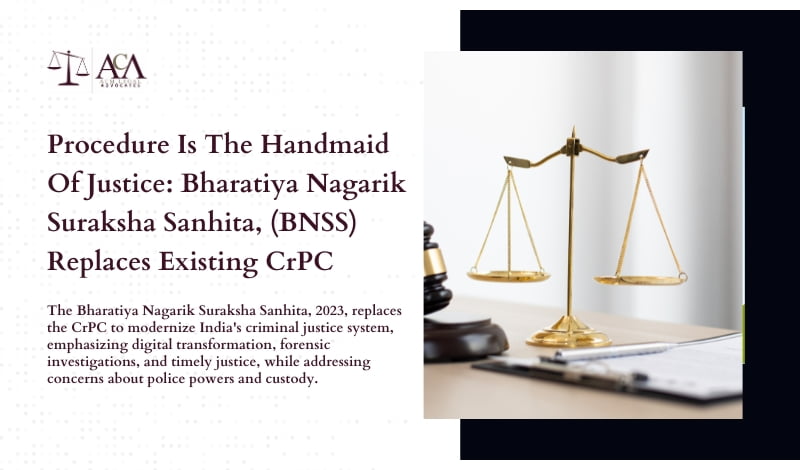The object of criminal administration of justice is-
We cannot be true ourselves, if we are not true to others. We cannot be free individually unless every individual regards and respect the freedom of his neighbors’. P K Sen, (Member, Constituent Assembly)
The Code of Criminal Procedure, 1973 (CrPC) is a procedural law established for the administration of the Indian Penal Code, 1860 (IPC). It governs the procedure for investigation, arrest, prosecution, and bail for offences. The CrPC was first passed in 1861 to address the problem of multiplicity of legal systems in India. Since then, it has been revised on multiple occasions. In 1973, the erstwhile act was repealed and replaced by the existing CrPC, and changes like anticipatory bail were introduced. It was amended in 2005 to add changes such as provisions for plea bargaining and rights of arrested persons. As a cornerstone of India’s criminal justice system, the Cr.P.C. 1973 ensures fair trials and adherence to the principles of natural justice for the accused.
Over time, the Supreme Court has interpreted and revised the application of the CrPC in various ways. These include: (i) requiring the registration of an FIR if a complaint pertains to a cognizable offence, (ii) making arrests an exception for offences with punishments of less than seven years of imprisonment, and (iii) ensuring that bail for bailable offences is an absolute and inalienable right, with no discretion exercised in such matters. This article examines the key provisions and changes in the Cr.P.C. 1973, following the introduction of the Bharatiya Nagarika Suraksha Sanhita (BNSS), 2023.
Vision Behind Enactment of New Bill
In the year 2023 Home Affairs Minister Mr. Amit Shah introduced three new criminal laws: the Bharatiya Nagarika Suraksha Sanhita Bill, 2023, the Bharatiya Sakshya Bill, 2023, and the Bharatiya Nyaya Sanhita Bill, 2023, to replace the Cr.P.C. 1973, the Indian Evidence Act (IEA), 1872, and the Indian Penal Code, 1860, respectively. During his Lok Sabha speech, the Union Minister emphasized three main objectives: replacing colonial-era laws, transforming India’s criminal justice system, and protecting citizens rights by focusing on justice rather than punishment. Prime Minister Shri Narendra Modi, in a social media post, hailed these bills as marking the end of colonial-era laws and the beginning of a new era centered on public service and welfare.
Bharatiya Nagarika Suraksha Sanhita, 2023
The Cr.P.C. 1973 has ensured fair trials and mitigated delays within India’s criminal justice system. Despite amendments, issues like trial delays, low conviction rates, backlogs, and limited technology persist. To address these, the Bharatiya Nagarika Suraksha Sanhita Bill, 2023, was introduced on August 11, 2023, in the Lok Sabha. This bill was replaced by the Bharatiya Nagarika Suraksha (Second) Sanhita Bill, 2023, on December 12, 2023. Passed by both houses on December 20 and 21, 2023, it received presidential assent on December 25, 2023. Here are the key provisions and changes of the new law.
Key Provisions and Changes
- Total Sections: The new law includes 533 sections (up from 484 in the Cr.P.C.), emphasizing digital transformation with the use of forensic sciences and technology in investigations. FIR registration and legal proceedings can be conducted electronically, and Section 355 allows the accused’s personal attendance through audio-video means.
- Expanded Definitions: Section 2 introduces definitions for ‘audio-video electronic means, bail, bail bond, bond, and electronic communication. It also clarifies that provisions of a special Act will prevail if inconsistent with this Sanhita.
- Zero FIR: Section 173 mandates zero FIR registration, allowing information on cognizable offences to be given orally or electronically, irrespective of the offence location.
- Forensic Investigation: Section 176(3) requires forensic experts to visit crime scenes for offences punishable by at least seven years of imprisonment, with videography of the process.
- Specific Timelines: Sections 230, 232, 250, 258, and 263 set specific timelines for various legal procedures to address delays in investigation and trial.
- Magistrate’s Powers: Section 349 expands the Magistrate’s authority to order specimen signatures, handwriting, voice samples, and finger impressions.
- Trial in Absentia: Section 356 allows for the inquiry, trial, or judgment in absentia for proclaimed offenders, considering their absence a waiver of their right to be present.
- Police Authority: The law authorizes any police officer, regardless of rank, to request a medical examination of the accused, and broadens police powers in property seizure to include immovable properties.
Criticism and Concerns
While the BNSS introduces significant improvements, certain provisions have drawn criticism:
- Police Custody: Allowing up to 15 days of police custody within the first 40 or 60 days of judicial custody raises concerns about potential violations of Article 21, which ensures personal liberty. This deviation from the CrPC’s 24-hour limit on police custody risks prolonged detention without bail if the full 15-day period is not used.
- Use of Handcuffs: The BNSS allows handcuffs during arrest in specific scenarios, diverging from Supreme Court guidelines in the Prem Shankar Shukla v. Delhi Administration case. Handcuffs can be used for habitual offenders, escapees, and those involved in serious crimes like rape, organized crime, and offenses against the State. This raises concerns about adherence to court precedents on the use of restraints during arrests.
- Restriction on Grant of Bail: Unlike the CrPC, which permits release on a personal bond if an accused has served half of their maximum imprisonment period (excluding capital offenses), Section 479 of the BNSS imposes further restrictions. It excludes individuals charged with life imprisonment or those involved in multiple cases, significantly limiting bail eligibility.
Conclusion
The Bharatiya Nagarika Suraksha Sanhita, 2023 aims to modernize India’s criminal justice system and meet the needs of a changing society. It emphasizes delivering justice swiftly while protecting citizens’ rights. The implementation of this new law will contribute to the timely delivery of justice in India.






